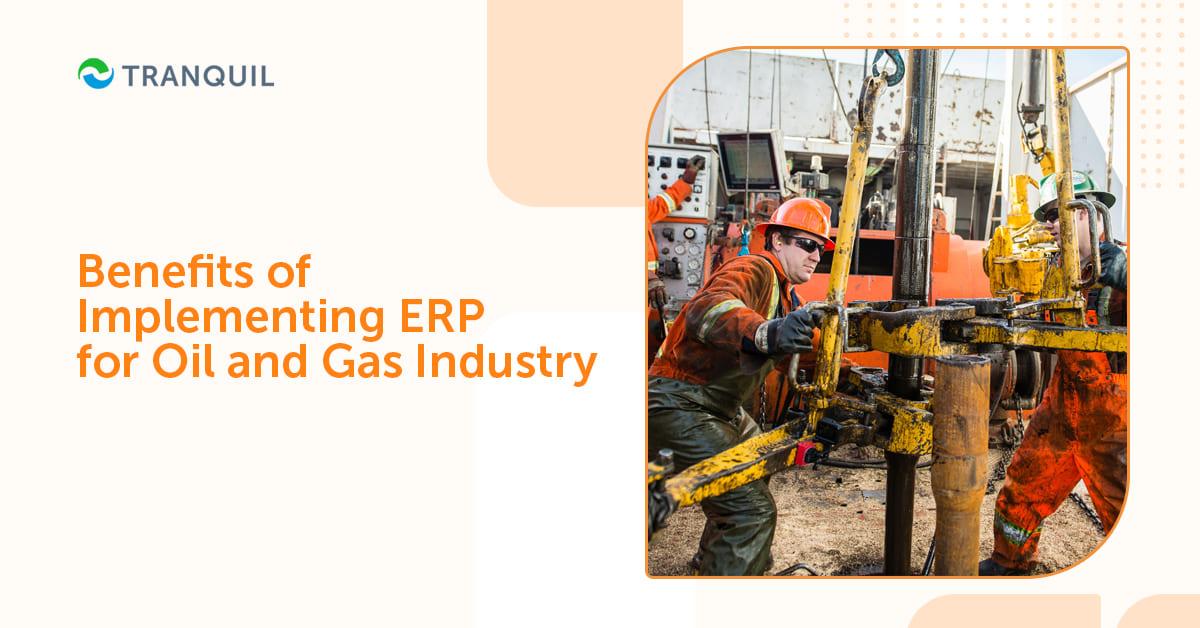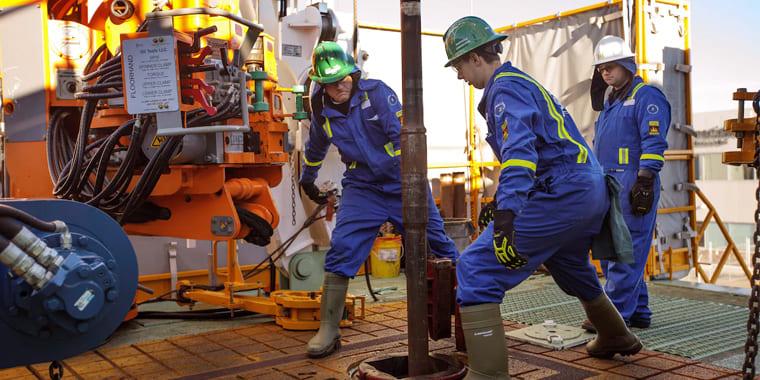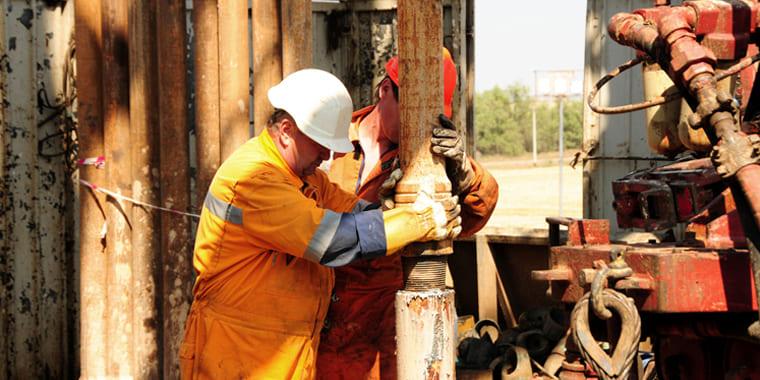
Oil and gas is a critically important industry, and also very expensive and complex.
They are highly reliant on accurate management of workflows and market analysis.
Managers in the industry struggle to keep up with the rapidly evolving demands of commodities and maintain a balance between changing regulations and resource availability.
Workplaces are spread across multiple geographic locations as well.
The demand for energy-related products is on the rise throughout the world as research results in innovative products that depend on oil and gas products to operate.
ALSO READ: Guide on How Do ERP Systems Work
ERP for oil and gas industry can help them manage their production better and enhance overall efficiency by integrating all the information in a central location in a single application.
It is not an entirely new concept; several oil and gas companies have been using ERP solutions since the 1950s.
However, depending on legacy systems can be problematic as other stakeholders like suppliers, distributors, and customers would have moved on to new, improved software.
ERP oil and gas is vital in ensuring greater efficiency of operations for oil and gas businesses corporations.
They can help monitor projects and operations effectively, ensuring growth and profitability.
However, when the business grows continuously, it is essential that the efficacy and vulnerability of the ERP system in use is evaluated; if it does not serve the purpose anymore, it may be time to switch to an innovative, effective, and cloud-based system like Tranquil.

The oil and gas industry is highly complex, with many regulations to maintain compliance with, and safety concerns to take care of.
It can be highly challenging to generate revenue and keep expenses down, but an ERP system can deliver the solution here.
ERP software for oil and gas industry typically has the following modules: Financial management, project management, inventory management, supply chain management, asset management, production management, and Operations Management, which helps manage natural resources, schedule production, and execute quality control measures.
When each level in the supply chain is well linked to the others, the operations can be managed more efficiently, and you will be able to respond to unforeseen circumstances quickly too.
ERP systems make sure that you have sufficient inventory to fulfil consumer demand while keeping carrying costs low and eliminating excess inventory.
Our ERP solution can make accurate forecasts thanks to its excellent data collection and analysis and robust report generation.
ERP oil and gas also helps in automating business processes, boosting efficiency and customer satisfaction.
Integration of all the relevant data into one application makes it easy to handle all the tasks and processes efficiently and increases productivity.
ALSO READ: Important ERP Modules and Functions
In an era where the world is searching for alternatives to oil and gas products, ERP systems are even more valuable, and mission-critical to operations than ever.
Increasing compliance mandates and wildly fluctuating oil prices, and volatility of resources has sealed the need for ERP solutions for the monitoring and management of business operations.
Oil companies have been using ERP systems for managing their functions of exploring, producing, refining, distributing, and retailing.
However, they are now also adopting ERP for managing support functions.
ALSO READ: Influence and Importance of ERP System in Different Industries
There are a number of reasons why businesses in the oil and gas industry use ERP.
Let us look at the benefits in detail:

The various processes involved in oil and gas exploration and production are critical and risky, and it is essential that these are monitored and managed efficiently.
This includes managing the rig, land and water management, site engineering, tracking the fleet, maintaining compliance, and checking performance of the workforce and project progress.
It is impossible to be present in far-flung locations all the time.
ERP systems allow access to users in real-time, empowering them with critical business information that can help them take vital decisions.
It also ensures inter-departmental communication and collaboration, boosting productivity and efficiency.
ALSO READ: Benefits of ERP for Steel Industry
ERP software can be easily integrated with third-party business applications, enabling you to monitor resources and expenses across your organization.
This is very valuable and can help in meeting production deadlines and deliveries.

ERP software has client-side and server-side functionality that can be tweaked to match your unique business requirements.
You can get overall visibility into your business processes, fulfilling the need for crucial data that help in meeting compliance and adhering to regulations.
It also helps your supervisors and managers to check on the progress of employees in real-time.
Thanks to sophisticated reporting and analysis, it can boost employee morale and productivity, and help you craft robust strategies to improve performance.
ALSO READ: Advantages of ERP to Automotive Businesses
ERP software can help oil and gas businesses to recognize the risks in a project much in advance so that you can have a clear picture regarding what to expect and about the potential success of the project.
It can also help with developing contingency plans to deal with emergency situations.

Oil and Gas ERP software will help you to reduce expenses by analysing your overhead and labour spends.
With a bird’s eye view of all expenditure, you can manage your demand and supply chain more effectively.
Tranquil has a feature-rich finance module that will also help you to maintain compliance with legal requirements and industry regulations, especially for international transactions, like entering into procurement or logistics deals with other nations.
Our software supports multiple currencies, so you can rest assured that everything will be managed smoothly.
ALSO READ: ERP Trends
Tranquil Cloud ERP will allow you to monitor and handle your onshore and offshore projects efficiently, including resources, finances, schedules, and inter-department communications.
Large and complex projects can be divided into smaller and easily manageable chunks like tasks and jobs, making it easier to meet deadlines and milestones, and to stay within the budget.
ERP software is especially valuable when there are international joint ventures, facilitating local technical assistance and finance management.
ALSO READ: Benefits of ERP for Chemical Industry
The oil and gas industry is essentially an international one; wells and refineries are often in separate countries, and customers are spread all over the world.
Each nation has its own taxation laws and systems, which may be based on sales revenue or volume that comes in or goes out of that country.
A company that wants to do business must be prepared to present whatever financial reports the tax and regulatory authorities demand; a business should also try its utmost to reduce the tax burden on itself.
Tranquil is adept at handling the local reports and in balancing the international tax burden.
The asset management module in Tranquil helps you maximize the performance of your assets.
Regular maintenance can help in ensuring excellent performance, prevent disruption in production, and extend the working life of your assets.
An ERP system will help you automate the maintenance schedules so that you don’t forget, and meticulously track all your assets, even after you have retired them or they get stolen or damaged.
ALSO READ: What are the Key Stages of Fixed Asset Life Cycle?
To ensure efficiency in operations in the oil and gas industry, it is crucial that there are asset controls.
This is because there are wide-ranging dependencies that include acquisition, development, research and development, shipment, etc.
Additionally, you have industrial equipment like rigs, heavy vehicles, pipes, different software systems, hardware and so on, which are all utilized in the delivery of the final product.
A robust ERP system will be able to handle these disparate elements smoothly and without hassles.
ALSO READ: ERP software in Warehouse & Fixed Asset Management

In the oil and gas industry, quality control is a very important aspect – and ERP software is valuable here.
The oil and gas products are expensive and essential but potentially hazardous to the environment too.
ERP software is capable of tracking loss in distribution to minimize incidences and to help with compliance reports in purification and refining.
The losses may be solid, liquid, or gaseous; ERP software can help with the conversions.
Each business has its unique requirements; Tranquil ERP can be customized to ensure that your needs are fulfilled optimally.
ALSO READ: How ERP Can Improve Business Efficiency?
ERP software can be leveraged to pass on the vital technical information to the new engineers and technicians, as all the data is recorded in the software.
The ERP can easily integrate new recruits into the various processes like energy exploration, monitoring, production, refining, and so on.
ALSO READ: Benefits of Having an Employee Self-Service System
BI is important for all businesses but especially so in the oil and gas segment; international politics and economic conditions need to be constantly monitored to establish the potential impacts on supply and demand.
Companies have to stay on top of compliance requirements, which are subject to change suddenly without notice.
ALSO READ: BI vs ERP
The oil and gas sector is one of the most highly regulated industries, with rules becoming stricter ever so often.
Having to manually keep track of changing regulations across all the countries that a company deals with, can be quite overwhelming and time-consuming.
ERP software for oil and gas can help in this regard, notifying you of any changes in regulations, and helping you stay in compliance.
ALSO READ: Factors for a Successful ERP Implementation
ERP software is an indispensable tool for any business that is serious about improving productivity and efficiency; in an industry like oil and gas, it is absolutely critical, thanks to the intense competition, and unstable economic and regulatory environments that it operates.
Robust ERP software like Tranquil can help ease your work in this regard. It’s a secure, cloud-based ERP solution that will make life simpler. Don’t believe us? Simply schedule a demo at a time of your convenience, and we will be happy to show you how!